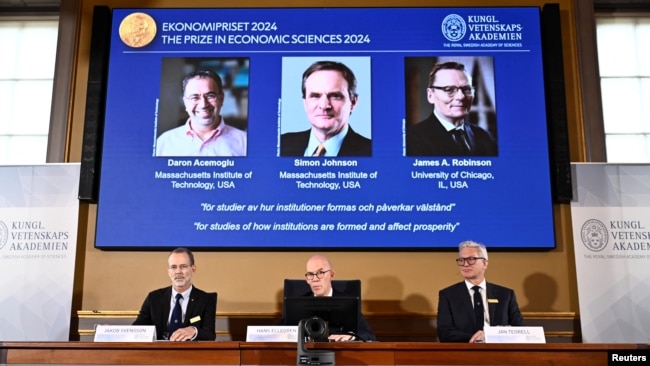今も続く侵略、戦争、亡くなる人々
ユニセフの世界の子供を貧困から救う支援活動
半世紀しか継続維持できないとする独裁国家体制の提示、しかしながらコロナで見えた民主主義の限界
民主主義国家”包括的社会 ”への移行に成功していると示している韓国、台湾、モーリシャスは現在独裁国家の脅威に晒されている現状
いろんなことが一瞬にして私の心と頭を捉えて離しません。
一生に一度しか見れない”アトラス彗星”、今年最大の”スーパームーン”?
”Why Nations Fail: The Origins of Power, Prosperity, and Poverty”必読します!!
Nobel Prize Brings Attention to Worldwide Inequality
The Nobel Committee has brought attention to worldwide inequalities by awarding its economic prize to three Americans: Daron Acemoglu, Simon Johnson, and James A. Robinson.
The Nobel committee of the Royal Swedish Academy of Sciences said the three won the 2024 Nobel Economics Prize “for studies of how institutions are formed and affect prosperity.”
Committee chair Jakob Svensson said, “Reducing the vast differences in income between countries is one of our time’s greatest challenges.” He added that their research has provided “a much deeper understanding of the root causes of why countries fail or succeed.”
The wealthiest 20 percent of the world’s countries are now around 30 times richer than the poorest 20 percent, the Royal Swedish Academy of Sciences noted. The difference continues although poor countries have become relatively richer.
In 2021, the World Inequality Report said that the poorest half of the world’s population owned just two percent of wealth while the richest 10 percent controlled 76 percent of wealth.
Acemoglu and Johnson work at the Massachusetts Institute of Technology, while Robinson conducts his research at the University of Chicago.
Their findings are included in the 2012 book Why Nations Fail: The Origins of Power, Prosperity, and Poverty written by Acemoglu and Robinson.
In their work, the winners studied the city of Nogales, which sits on both sides of the U.S.-Mexico border.
Despite sharing the same geography, climate, many of the same ancestors and a common culture, life is different on either side of the border. In Nogales, Arizona, to the north, people are relatively wealthy and live long lives; most children complete high school. To the south, in Mexico’s Nogales, Sonora, people are much poorer, and the city suffers from organized crime and corruption.
The difference, the economists said, is a U.S. system that protects property rights and gives citizens a say in their government.
The book includes evidence from ancient Rome to modern-day Nogales. It says that “inclusive institutions” make countries richer. It also says democracy, the rule of law and the protection of property rights prevent a small ruling class from owning most resources and wealth.
Reached by the academy in Athens, Greece, the Turkish-born Acemoglu said he was surprised and shocked by the award. He said the research honored by the prize underscores the value of democratic institutions.
“I think broadly speaking the work that we have done favors democracy,” he noted.
Acemoglu and Robinson had to explain why some countries with less-than-democratic systems, like Singapore and China, have become much wealthier.
Robinson told the Associated Press that he does not believe China can continue its economic prosperity under a repressive political system.
“There’s many examples in world history of societies like that that do well for 40, 50 years,” Robinson said by phone. “What you see is that’s never sustainable...The Soviet Union did well for 50 or 60 years. Argentina was one of the richest countries in the world at the time of the First World War. What our theory predicts is that’s a transitory situation.”
Robinson said many societies have successfully made the transition to what he, Acemoglu and Johnson call an “inclusive society.’’
“In the modern world, you’ve seen that in South Korea, in Taiwan, in Mauritius,” he said.
The Royal Swedish Academy of Sciences awards the prize in memory of Alfred Nobel. The prize was established after Nobel’s death.
Words in This Story
institution –n. an established organization
prosperity –n. a state of growing, improving and being successful
vast –adj. very large in extent or size
transitory –adj. taking place over a relatively short period of time; changing over time
ノーベル賞で世界の不平等が注目される(和訳)
ノーベル委員会は、3人のアメリカ人に経済賞を授与することで、世界的な不平等に注意を喚起しました: ダロン・アセモグル氏、サイモン・ジョンソン氏、ジェームズ・A・ロビンソン氏です。
スウェーデン王立科学アカデミーのノーベル委員会は、この3人は、”制度institutionsがどのように形成され、繁栄prosperitに影響を与えるかについての研究”により2024年のノーベル経済学賞を受賞したと述べました。
委員長のヤコブ・スヴェンソン氏は、「国家間の所得格差the vast differences in incomeの縮小は、現代における最大の課題のひとつである」と述べました。さらにスヴェンソン委員長は、彼らの研究は”なぜ国が失敗したり成功したりするのか、その根本的な原因をより深く理解するためのものである”と付け加えました。
スウェーデン王立科学アカデミーは、世界の最も裕福な20%の国が、最も貧しい20%の国の約30倍も豊かになっていると指摘しました。貧しい国々が相対的に豊かになったとはいえ、この差は続いています。
2021年に発表された the World Inequality Report 世界不平等報告書 によれば、世界人口の最貧困層の半分が所有する富はわずか2%であるのに対し、最富裕層の10%は富の76%を支配しているといいます。
アセモグル氏とジョンソン氏はマサチューセッツ工科大学、ロビンソン氏はシカゴ大学で研究を行っています。
彼らの研究結果は、アセモグル氏とロビンソン氏著書の2012年に出版された Why Nations Fail: The Origins of Power, Prosperity, and Poverty なぜ国家は失敗するのか:権力、繁栄、貧困の起源 に収録されています。
受賞者たちは、アメリカとメキシコの国境の両側に位置するノガレス市を調査しました。
同じ地理、気候、同じ祖先の多く、共通の文化を共有しているにもかかわらず、国境のどちら側でも生活は異なります。北側のアリゾナ州ノガレスでは、人々は比較的裕福で長生きし、ほとんどの子供たちが高校を卒業しています。南のメキシコ、ソノラ州ノガレスでは、人々はずっと貧しく、街は組織犯罪と汚職に苦しんでいます。
その違いは、財産権を保護し、市民に政府に対する発言権を与えるアメリカの制度にあると経済学者たちは言います。
この本には、古代ローマから現代のノガレスまでの証拠が含まれています。”包括的な制度”が国を豊かにするとい言っています。また、民主主義、法の支配、財産権の保護は、少数の支配階級ruling classがほとんどの資源と富を所有することを防ぐといいます。
ギリシャのアテネにあるアカデミーの取材に応じたトルコ出身のアセモグル氏は、受賞に驚き、ショックを受けていると語りました。受賞の栄誉に輝いた研究は、民主主義的制度の価値を強調するものだと彼は言います。
「大まかに言って、私たちの研究は民主主義に有利だと思います」と彼は指摘します。
アセモグル氏とロビンソン氏は、シンガポールや中国のような民主主義制度があまり整っていない国々が、なぜはるかに豊かになったのかを説明しなければなりませんでした。
ロビンソン氏はAP通信の取材に対し、中国が抑圧的な政治体制の下で経済的繁栄を続けられるとは思えないと語りました。
「そういう社会が40年、50年とうまくいっている例は世界史にたくさんあります。」とロビンソン氏は電話で話しました。「我々が見ているように、それは決して持続可能なことではありません。ソ連は50年、60年はうまくいきました。アルゼンチンは第一次世界大戦当時、世界で最も豊かな国のひとつでした。私たちの理論が予測するのは、それは一過性のものtransitoryだということです。」
ロビンソン氏は、多くの社会が、彼、アセモグル氏、ジョンソン氏の言う ”包括的社会 ”への移行に成功していると言っています。
「現代世界では、韓国、台湾、モーリシャスでそれを見てきました。」と彼は言います。
スウェーデン王立科学アカデミーは、アルフレッド・ノーベルを記念して賞を授与しています。この賞はノーベルの死後に創設されました。
